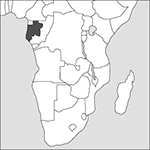
Source: MAPS IN MINUTES™ © RH Publications (1997)
Capital:
Libreville
Area:
267,667 sq km (103,347 sq miles)
Population:
1,640,286 (2013 est)
Currency:
1 CFA franc=100 centimes
Religions:
Christian: between 55.0% and 75.0%; Muslim and traditional beliefs
Ethnic Groups:
Fang, Bapounou, Nzebi, Obamba, and other tribes
Languages:
French (official); Fang; Myene; Nzebi; Bapounou; Bandjabi
International Organizations:
UN; AU; Non-Aligned Movement; Franc Zone; WTO
An equatorial country on Africa’s Atlantic coast, bounded inland by Equatorial Guinea, Cameroon, and Congo.
Physical
Along the coast of Gabon are many lagoons, mangrove swamps, and large deposits of oil and natural gas. A broad plain covered by thick rainforest rises gradually to a plateau which surrounds a central river valley, and near the head this vegetation gives way to savannah.
Economy
Oil discovered in the 1970s has made Gabon one of the wealthiest African countries, but with a wide disparity in income levels. Other exports include timber, manganese, and uranium. The government is attempting to attract investment to diversify the economy.
History
In 1839 the French made it a naval base to suppress slave trade. Thus a French colony developed, exploiting the rare woods, gold, diamonds, other minerals, and oil. The country became autonomous within the French Community in 1958 and fully independent in 1960. Almost entirely on the basis of its natural resources it has had one of the fastest economic growth rates in Africa. After early years of political instability, Omar Bongo was elected President in 1967 and continued to rule until his death in 2009. Although multiparty politics was restored in 1990, Bongo and his Gabonese Democratic Party were repeatedly returned to power in elections widely seen as flawed. After Omar Bongo’s death, his son Ali Bongo was elected President; he was re-elected in August 2016.
- Cantor distribution
- Cantor, Georg (1845–1918)
- Cantor, Georg Ferdinand Ludwig Philipp
- Cantor-Schröder-Bernstein Theorem
- Cantor set
- Cantor’s Diagonal Theorem
- Cantor’s Intersection Theorem
- Cantor’s paradox
- Cantor’s theorem
- Canute
- canyon
- Cao Cao (155–220)
- CAP
- cap
- capabilities
- capability analysis
- capability architecture
- capability constraint
- capability list
- Capability Maturity Model
- capability ratio
- capacitance
- capacitance integrator
- capacitance strain gauge
- capacitance(symbol: C; unit: farad)